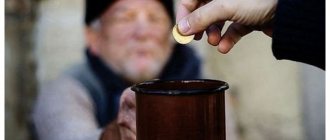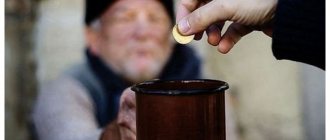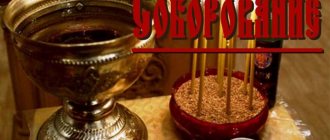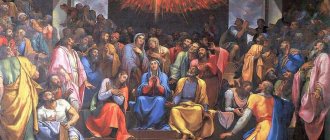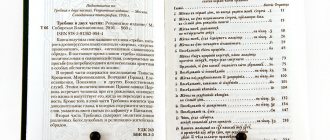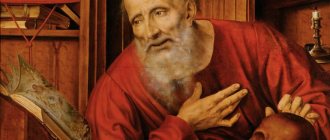ABOUT ALMS. Saint Luke
ABOUT ALMS. Saint Luke (Voino-Yasenetsky)
Peace be with you, dear visitors of the Orthodox website “Family and Faith”!
Almsgiving is the main characteristic of a Christian! For the Lord measures the hearts of people with virtue. How kind we are to those around us, to our poor brethren, is how kind our Heavenly Father is to us.
And Archbishop Luke (Voino-Yasenetsky) delivered a brilliant sermon on the importance of giving alms, which we attach below for edifying reading.
About alms
In the Epistle to the Corinthians, now read, St. The Apostle Paul calls the Corinthians to the great work of almsgiving. He gives them as an example the Macedonians, who were deeply poor, were destitute, and yet, out of their poverty, they gave help to needy Christians in Palestine.
And says St. Apostle to the Corinthians: “He who sows sparingly will also reap sparingly; and whoever sows generously will also reap generously” (2 Cor. 9:6).
He is not talking about the harvest, not about sowing bread, but about sowing alms. “He who sows sparingly will also reap sparingly.”
This happens in the affairs of God, but in earthly affairs it happens differently: it happens that a farmer sows little, sparingly, but God Himself sends a high harvest, and he who sows little will reap much.
It also happens, on the contrary, that he who sows generously will not reap generously: the hail will destroy what was sown, and the farmer will not reap anything.
But in the affairs of God this cannot be the case: always and invariably the one who sows sparingly also reaps sparingly, and the one who sows generously also reaps generously.
The Holy Apostle commands us to sow a lot. The Lord Jesus Christ Himself called us to alms more than once, and listen to the great importance He attached to almsgiving - absolutely exceptional importance. In his speech denouncing the scribes and Pharisees, who considered the washing of cups, mugs and benches a very important matter, He said this: “Better to give alms from what you have, then everything will be clean for you” (Luke 11:41 ).
These words do not apply only to the scribes and Pharisees, we must also apply them to ourselves. If we give alms, then, according to the word of Christ, everything will be clean for us.
He said about the scribes and Pharisees that their insides were full of robbery and wickedness, but that if they gave alms, then their insides, full of robbery and wickedness, would become clean.
This is how we should think about ourselves. And our insides, our hearts, are often unclean, very unclean, full of iniquities. We need, we need to cleanse our insides, our hearts, and the Lord shows us an unusually simple means for this: just give alms, and then everything will be clean, your whole inside will be clean.
Remember this, remember that the power of alms is immeasurably great.
St. John Chrysostom calls alms the queen of all virtues. He says that alms open heaven itself to us. He says that by the power of the alms given to us, we can, unrestrained and unstoppable by any ordeals, freely ascend to the very throne of God. He reminds us of the centurion Cornelius, a pagan who was very merciful, did a lot of alms and constantly prayed. And God sent His angel to him, who said to Cornelius: “Your prayers and your alms have risen up as a memorial before God” (Acts 10:4). Ascended to God...
Do you hear, they ascend straight to God, ascend to God’s throne, pass through the heavens without stopping, pass by all the heavenly bodies, past the regiments of angels, past the seraphim and cherubim, and, without stopping anywhere, our alms boldly and quickly ascend to God himself.
You know, I have told you about this more than once, how and for what our Lord Jesus Christ will judge humanity when the Day of the Last Judgment comes. He will not ask any of us whether you went on pilgrimage; He will not ask whether you worshiped My tomb in Jerusalem? Were you a virgin? This will not be asked, only one thing will be asked: did you give alms? Have you done deeds of mercy?
And at the same time he will say amazing words: “Truly I say to you, just as you did it to one of the least of these brothers of mine, you did it to me” (Matthew 25:40).
All the good that we do for the poor, our unfortunate brothers, He accepts as being done for Himself. Every alms that we drop into the hand of the poor, He Himself accepts into His hands.
O Lord, our Lord! How great it is: You Yourself accept our alms. We must give alms to You, our God. But the word of God is true and unchangeable, and every alms that we give to our unfortunate, destitute brothers is alms given to the Lord Jesus Christ Himself.
Oh, how great this is, and how we need to think about the words of the Apostle that we cannot give alms sparingly, for sparingly we will reap God’s grace for it.
We must create it always, tirelessly, not just from time to time. You must make alms your constant companion, you must bind your heart with mercy.
And if we give alms not stingily, but generously, then we will also reap great grace, for this is what the Lord Jesus Christ Himself says: “Give, and it will be given to you: good measure, shaken down, pressed together, and running over, will be poured into your bosom” (Luke 6). , 38).
You see, for a piece of bread, for a cup of cold water that we give to a beggar, the Lord will reward us with an extraordinary measure, a good measure, shaken down, pressed down, He will reward us immeasurably more than what was given to Him in the person of our poor brothers.
Next says St. Apostle: “Let each one give according to the determination of his heart, not grudgingly or under compulsion; for God loves a cheerful giver” (2 Cor. 9:7).
And how many of us are there who serve with chagrin, with reluctance, as if under duress. And how infinitely far we are from the spiritual state in which the great merciful people lived, such as Saint John, Patriarch of Alexandria.
He was the living personification of mercy. He strained all the strength of his mind to help everyone and everywhere. Having ascended the patriarchal throne, he ordered his fellow servants to go around the entire huge city of Alexandria and register all its benefactors.
His subordinates asked in surprise: “Vladyka, which benefactors should we rewrite?” He said: “Beggars, beggars, hungry, cold, naked.”
And seven thousand people were registered, and Saint John fed and clothed them every day.
He mourned that day that passed without deeds of mercy with bitter tears and considered it a lost, worthless day of his life. He did charity “not with grief or under compulsion,” he was a willing giver whom God loves.
He never thought that his funds might become scarce; he gave away all his property without looking back. And the Apostle Paul says: “God is able to make all grace abound to you, so that you, always having all sufficiency in everything, may abound in every good work.”
And how many, many times these words have come true for kind, merciful, holy people.
And how often do we read in the lives of the saints that they gave away without reserve everything that was available in the monastery to feed hundreds of wanderers, and the steward of the monastery came and said to the holy abbot: what are we going to do? Everything has been distributed, all the bins are empty, the brethren have nothing to eat.
But the saints were not embarrassed, they placed all their hope in God, and God did not abandon them: always in such cases the monastery barns were filled, or in some other miraculously unexpected way what was needed was sent.
So it was with our venerable father Sergius of Radonezh, so it was with Euthymius the Great, with Savva the Sanctified and with many other saints.
The Lord did not abandon anyone and always helped those who were completely merciful.
“As it is written: He lavished it, he gave it to the poor; his righteousness endures forever.”
He squandered everything, gave everything away to the poor, it seemed that he had nothing left, but his truth remained, the truth that endures forever, which will ascend to the throne of God.
“Whoever gives seed to the sower and bread for food will provide abundance for what you sow and will multiply the fruits of your righteousness.”
We must sow, sow alms, sow truth, and what we sow will be increased by God Himself, and will sometimes increase thirty times, sometimes sixty times, and sometimes a hundred.
“So that you may abound in all manner of generosity, which through us produces thanksgiving to God” (2 Cor. 9:11).
But it is extremely important how we give alms, how we do works of mercy, for if we satisfy the needs of the unfortunate with sincere love, then we also do another great thing: we instill gratitude to God in their hearts. Mercy has such power that it can turn to God even the hearts of the poor who live without God, for there are such.
Almsgiving has enormous, endless power, and here is an example: at the end of the 4th and beginning of the 5th centuries, Bishop Paulinus the Merciful lived in Italy. He came from a very noble, high family; at the age of twenty he was appointed senator, then consul - these are large, important positions - then governor of the most important Roman region of Campania.
And he despised everything, left everything, distributed his property to the needy and became a monk. He experienced a lot of reproach, mockery, ridicule even from his former servants, but was not embarrassed by anything. Having become a bishop, he began to generously distribute church property to the poor.
During his time, Italy was invaded by the Vandals, a wild and cruel people. The Vandals conquered the Romans and took many people captive, and Bishop Paulinus, as much as he had money, ransomed the captives. A poor widow came to him, crying and asking him to ransom her only son, who had been taken prisoner by the Vandals. He said: “My dear, I have no more money left, but we’ll do this: take me to the camp of the Vandals, let them take me instead of your son, and let him go.” And he himself surrendered to the vandals.
The Vandal prince, this wild, cruel man, was amazed at the meekness and nobility of his new slave: he watched him and was amazed at the heart beating in Peacock’s chest. And by chance he found out that it was a bishop. He was amazed and filled with such reverence for this noble man that he not only released him, but also released all the Roman prisoners along with him.
Thus, Saint Paulinus himself redeemed many unfortunate captive Romans from captivity. Thus, these words of Pavlova came true - “so that you may be rich in all kinds of generosity, which through us produces thanksgiving to God.”
Our mercy produces great gratitude to God in people who are far from Him.
What could be stronger than mercy? Obviously nothing.
The Lord Jesus Christ placed this virtue above all virtues; The apostle called the Corinthians to this virtue.
I also urge you to this same virtue, I urge you to be constant and zealous in almsgiving, so that you understand the immeasurable power in it.
Give alms, each one according to his own strength. It is not required that you give everything, but only that you give to your neighbors a portion of your property, even if it is meager.
And in the words of Christ about the widow who put into the treasury only two mites - two pennies - it is said that she put in much more than all those who put silver and gold in the basket, for she gave everything she had, all her food.
The Lord is philanthropic, the Lord does not require excessive feats.
He says in the parable of the sower that if his good word, the word of preaching, falls on good soil, it will grow and produce fruit either thirty times, or sixty, or a hundred times.
Know, know that the Lord so deeply values our love for our neighbors, our mercy and our alms, that even if our good deeds bear fruit only thirtyfold, He will accept this too, with blessing, no matter how little good we do, no matter how No matter how much they helped His poor brothers, He will accept everything with blessing. And you will hear from Him at the Last Judgment: “Come, you blessed of My Father, inherit the kingdom prepared for you from the foundation of the world” (Matthew 25:34).
May this promise be a true and holy promise to all of you.
May the fruits of your good deeds increase at least thirtyfold. And then not even a piece of bread, not even a cup of water will go without reward, as long as it is served with love, with affection, with greetings.
Amen.
October 21, 1951
Selfless alms are more valuable than gold!
WHAT IS ETERNAL LIFE
<< To the main page Spiritual reading >>
Pay attention to the sayings of St. Macarius of Optina:
The quality of almsgiving is a heart that burns with love for every creature and desires its good. Almsgiving does not consist in alms alone, but in compassion, when we see a created person akin to us in some kind of suffering and, if we can help him in any way, we help. This almsgiving is only giving without embarrassment and trial - to give at least a little, but with good will and hope
Venerable Macarius
One should not go into debt for the sake of alms. In church history, it is nowhere to be seen that any of the exemplary alms-lovers would bind themselves to debt for the sake of alms. Moreover, it is necessary to keep in mind the circumstances of your own family, so as not to bring it to an extreme situation with unfounded and thoughtless generosity...
Venerable Macarius
What is alms
The very essence of alms is a truly human heart, able to empathize and burning with love for every living creature. The alms giver not only selflessly gives something material and spiritual, but also shows great compassion by taking upon himself a small part of the fate of unfortunate people.
The word “alms” in Orthodoxy refers to deeds of Christian love
When weaknesses in the face of passions reign on earth, God teaches us to be saved from sins through alms. Such continuous charity returns to people the blissful mercy of the Lord.
After the fire
It was scary to watch. My children’s clothes were scattered in colorful dotted lines across the dirty spring snow. I walked along the side of the road and almost mechanically picked up Antoshka’s yellow jacket, Nikita’s blue pants, the sweater knitted for Gleb by Grandma Olya... And then I stood confused on the road with an armful of wet, soiled children’s clothes. And I didn’t understand what to do next...
A couple of days before, a woman with sad eyes knocked on our door. Her story was bitter. A house in the village burned down. With two small children, she was suddenly left without a roof over her head, without things, without money. At first, their neighbors sheltered them. There is no husband, no relatives either. He doesn’t know how to live on. In the meantime, he walks around, begging for Christ’s sake.
It was ninety-eight. In a sense, we were also homeless then - with three children we huddled in yet another rented apartment without amenities. How can you not help someone else's misfortune? Only there was nothing special to help. They themselves could barely make ends meet. Well, what to do: the wife collected some food, gave some money, and apologized that she had nothing more to share. The woman thanked. And then she asked if we had any clothes for her children. Oh, how glad we were that at least we could help here! Well, we had plenty of this stuff. It took us a long time to choose everything that was most suitable, according to the season and size. We picked up two hefty bags. The woman was very pleased and wished us health and all the best when we left.
...And now I stood on a dirty dirt road, holding these things in my hands and didn’t know what to do with them. My soul felt heavy, as if my house had now burned down, and my jackets, pants and sweaters were all that had survived the fire. It’s stupid, of course... However, I couldn’t leave them on the road. Brought it home. And secretly, so as not to upset his wife, he hid it in the barn.
Three months have passed. One day I go into the yard and see: my wife is washing these children’s clothes donated to fire victims in a trough.
“What,” I say, “have you found a “stash”?”
“Yeah,” the wife sniffled. “I saw them back then, on the road.” I just didn’t tell you so as not to upset you. But I didn’t think to pick it up.
She paused and added quietly:
— There were also food items scattered there...
We thought and thought what had happened to us, but we never came to anything in our thoughts. They just washed everything and gave it to the boys to continue wearing.
